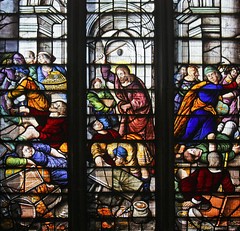The comments originally sent to my previous post, and my replies to them, were lost. I have retrieved the comments of others but my own are lost (unless someone reading this did catch them in an email — if you can forward them to me that would be great, thanks — my address is in the contact info on the right margin.)
A big thanks and free virtual beer to the subscriber who was able to email me my original comment. It was written early in the morning when I was alert, unlike the ponderous and detailed response of this post that was written late at night at the end of a long day. My original brief response is now returned and reunited with the comments of the previous post.
Anyway, I am replying here more fully to James McGrath’s original comment on the off-chance that there are others also reading this who share his criticisms of my original post. James wrote in his first paragraph:
Two things, neither of which has to do with Crossley’s or Seeley’s arguments but which have to do with methodology. First, you wrote “Crossley does not like literary criticism when it counts against historicity (as it so often does).” I’ve never encountered a literary critic who considered their method as a means to answering historical criticism. Literary criticism treats a text as a piece of literature and sets aside historical questions. Historical criticism asks historical questions. To say that literary criticism counts against historicity sounds to me like utter nonsense, but perhaps you wish to clarify.
Literary criticism and history
Certainly. I was responding to what I understood were James Crossley’s views on the role of literary criticism in history. In my original post I quoted part of a sentence of his in Dating Mark that spoke negatively of those approaching historical questions from a literary-critical perspective, and this jells with what he writes in a book Crossley co-edited, Writing History, Constructing Religion:
Some historians have been completely unaccommodating to all things post-modern. One of the most famous critics was G. R. Elton who claimed that historians are, in a way, fighting for their lives in the face of ‘people who would subject historical studies to the dictates of literary critics’.
So it looks as though post-modernists and a few others do at least acknowledge an overlap between literary criticism and history. But I had only read that sentence of Crossley’s in its original context in his “Writing History, Constructing Religion” book after I published my blog post. I had originally encountered that quote in a context that led me to think Crossley himself was as opposed to the role of literary criticism in history as was Elton. But that is clearly not so, as I have since learned. Live and learn. Always check sources for oneself even/especially if they’re from your grandmother!
But literary criticism at some level is inevitable in the historical process — even in biblical historical studies.
If a historian reads a text as a factual historical account she is bringing to that text a certain literary-critical perspective or judgment. Conversely, if she reads it as a totally fictional piece of escapism, she is bringing to her reading a different literary-critical judgment. Neither perspective means that the text is 100% historical fact or 100% fictional. Actual historical data might still be a matter of a second-layer of judgment, but the initial literary-critical assumptions brought into play will inevitably steer the way a historian analyzes the text.
And at a more micro level, we can take the Temple Action of Jesus as a case in point. Seeley, Mack and Fredriksen all question the historicity of the Temple Act of Jesus. And they do so on the grounds that the narrative details of this pericope are best explained by broader literary-thematic interests of the author when compared with the rationales offered for it as an historical event. Fredriksen (as originally quoted here along with Mack et al) sums up the literary-critical basis for denying its historicity:
Actual history rarely obliges narrative plotting so exactly
If one can see an immediate tangible literary explanation for a detail in a narrative and has to balance the odds of its historicity against a number of layers of assumptions (with no visible means of support) of oral transmission, theological interests and genuine historical events, then what does Mr Occam advise?
I side with Seeley, Mack, Fredriksen and a few others I am sure who believe it is literary critics who beat the historicists in the detail of the Temple Action of Jesus.
In my original (previous) post I pointed to Crossley’s use of literary criticism in coming to his estimation that the author of Mark’s gospel was exaggerating with respect to point X rather than narrating a literal exact fact. Crossley, and no doubt most historians, acknowledge that some degree of literary criticism is necessary in order to sensibly determine what an author is really intending to convey.
So literary criticism works at several levels of reading in any text, and each one is to some extent unavoidable in any endeavour to assess the historical value of a text. We may not always be conscious that we are making literary-critical assumptions or judgments when we read a text, but it is always inevitable that we are in fact doing so whether we realize it or not.
Part Two of James’ comment
Continue reading “Biblical history, literary criticism and logical method”

